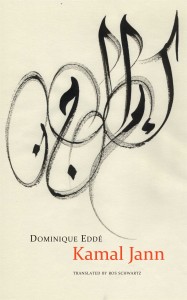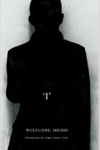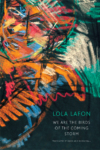 [Seagull Books; 2014]
[Seagull Books; 2014]
Tr. by Ros Schwartz
What to say about Dominique Eddé’s Kamal Jann? There’s much to say because this novel is so much and so many novels. It is a spy novel, a romance, a society novel, a psychological novel, it is littered with aphoristic reflections, moments of literary criticism, cultural and political analyses. Styles and genres jostle with each other. But it becomes too much and too many novels. There is a deficit in its excess, something decadent in its repletion. There is an attempt at aesthetic wholeness which, though flawed and in some places broken, is sometimes impressive — but also repulsive. In this review, we would like to give a sense of these leaps to completion, and also what they leap over, what they erase, what they cannot resolve; to try and show (and with what erasures of our own?) what absences gnaw at the mass of these 400 pages.
Let’s begin with Kamal Jann, the titular character and hero, and his place in the novel. He is a corporate lawyer caught between the schemes of the head of the Syrian intelligence services (who is also his uncle), the CIA, Israel, and a salafist controlling his jihadist brother, Murad. He is told that his brother is to perpetrate a suicide attack on the Syrian president while the latter visits Paris, and that he can only prevent this by helping to assassinate his uncle. Such is the basis for the action and the spy novel within Kamal Jann, but it’s far from a description of the novel as a whole and, indeed, the plot insofar as it deploys the conventions of a spy novel essentially ceases two-thirds of the way through.
More dominant throughout is the psychological novel within Kamal Jann, which is mainly concerned with Kamal’s response to an intolerable personal and political situation and his descent into madness in the face of it. This situation revolves around his uncle, who, as head of Syrian intelligence, not only embodies political evil but also engineered Kamal’s parents’ death and, fixated on Kamal, as so many in the novel are, abused him, and lifted him from his modest background by means of an elite American education. Thus Kamal’s agonies; the disparity between his life and that of his poorer brother, the machinations of political intriguers, the duplicity and self-interest of his New York set, his feelings of separation, and his desire, vacillations, and subsequent guilt regarding the assassination of his uncle. Other characters abound in the series of short scenes that compose the book, some existing for no more than one of these scenes, some given whole subplots. The numerous characters might be expected to provide a panorama, or a polyphony, but instead tend rather to help monumentalise a single perspective, for which Kamal Jann is the major vehicle. And Kamal is indeed, despite his agonies, a monumental, even mythical, figure.
An early scene uses dinner party chitchat to reinforce aspects of his character:
“Ooh, Kamal Jann, the famous lawyer, what a man! Isn’t he just charm itself?” “I wouldn’t say charm, Susan, oh no, I’d say mystery. Have you seen his eyes, they’re pure fire.” “Oh my God.” “I think Jann is an Israeli agent.” “Whatever next! And why’s that, Gary? Because he doesn’t use any of his six or seven languages to speak ill of the jews?” “Of course not! It’s much more complicated than that.”
Although there is some irony, even satire, in the way that this and other scenes of high society are conveyed in the novel, it is clear that, as exposition, this society gossip has the function not just of showing the reader how Jann is perceived but also how, with some irony (we will return to the question of this irony), we are to perceive him. Taking just one aspect of his radiance, those eyes, we are told in a moment of narration: “The most striking aspect of Kamal Jann’s appearance is his eyes. They pervade even his body.” The maximisation of these eyes takes place not just in the hyperbole of gossip but in the hyperbole of the narrative fabric itself (this impossible pervasiveness). Indeed, Kamal as a character would be merely a romantic enlargement of gossip, were it not that he has bad dreams. As a character in a spy novel, he is almost a James Bond type; ruthless, irresistible to women (in whom he seems to awaken an unpleasant submissiveness), urbane, intelligent. He even has some of the flash of Bond (when we first encounter him he is at the wheel of his Jaguar). But, as well as this “objective” type, he’s also a “subjective” type, the hero of a psychological novel; he has his agonies. In keeping with a certain tradition of the psychological novel, these are most evident in his moments of madness, for example:
With every step he shed a piece of himself. On reaching the museum, he turned left and continued alongside the racecourse. He thought about all the rooftop snipers who had littered the street with bodies during the war. He thought, killer . . . killer . . . am I a killer too? In answer to his own question he framed the words, I was killed first. Gradually, his thinking adjusted itself to his pace. His mind formed blocks of words and dismissed them as he walked. The right and the left foot took turns to speak. Damn it! Why Riwaya? Why the CIA? Why this damned poison? I should have shot him! [. . .] Shut it, Kamal. Shut up, do you hear me? Leave God out of it. Leave your father out of it. And your mother. Hush! [. . .] Jann! Jann! Jann! Where does our name come from? [. . .] Kamal was still walking furiously. Faster and faster. On the left-hand pavement now. The racecourse was behind him. He lashed out at nothing, oblivious to people.
While these moments give the reader privileged access to an interiority that at least seems to reject objectification, on a higher level the way Kamal is seen by the outside world and the fury of his madness are on a continuum. He is monumental not despite his agonies, as we wrote earlier, but also because of them. This is a noble madness, a tragic madness, as well as a site where the fullness of literary possibility is exercised. It brims with pathos and importance, and even a sense of Attic familial destiny, which is also nominative literary destiny (Jann means mad in Arabic). It blends seamlessly the themes of the book, just as Eddé mixes in the above passage abrupt objective description and stream-of-consciousness. It has an objective correlative, in the extremes of his personal situation and the political situation in the Middle East, and it has mythical resonance, a literary amplitude. It works, alongside his romantic image, to reinforce his greatness. The reader is elicited to enjoy equally glamour and madness in the literary body of the glamorous madman.
Let’s pause on the dialectical movement of the last sentence we wrote, which, in addition to its logical function, also serves a literary function. As well as summarise an argument, it also rounds one off, giving it a veneer of completeness. Similar constructions to this occur frequently in Kamal Jann. Eddé has a taste for the pithy summary and aphoristic speech, as in the following:
“Lebanon is inexplicable,” the French ambassador to Beirut told him recently at a reception at the Residence des Pins. “It is a country which logically should no longer exist. But we have to admit that the more it defies logic, the more it exists.”
Sometimes these aphorisms are deployed by the narratorial voice, but more often they are spoken by the characters, emerging from the mouths of journalists, stable boys, filmmakers, housekeepers or psychiatrists. They form isolated comments or exchanges (parts spoken by different voices), and, though they can sometimes have a kind of intriguing clarity, their finality is somehow jarring. The problem is not exactly one of verisimilitude. It is not that these characters wouldn’t really speak like this. It is true that we are unused to characters speaking like this in novels, which tend to employ more prosaic constructions, so that such formal completeness has the air of ornament. But really, the problem is that these aphorisms tend to efface the characters, to make them merely the site or excuse for ornamental thought. Abstracted, it would be very difficult to attribute them:
“He used to be a lawyer with no clients, now he’s a swindler with no lawyer.”
“A thought that is ignorant of what it does not know is a desire without a vision.”
“In a sense, it is because she knows what cannot be said that she takes her time before saying what she knows.”
But even with attribution here (respectively: the stable boy, the psychiatrist, and the narration) their salience overshadows the character who utters them. It is as if the character suddenly spoke for the benefit of history, or as if the novel, eager for a certain effect on the reader, wanted to eschew the mundane mediation of character, but still required the character as mouthpiece, site, name. Late in the novel, during a dialogue about Syrian politics and the question of freedom, a minor character, a workman, who is said to be speaking with unusual eloquence, says: “I sometimes wonder if it’s me who’s thinking when I think.” He seems to be talking about the regime, its propaganda and its brutal restriction of expression, but could this not also be seen as the character reflecting on the novel’s use of him? He is eloquent because he has been possessed by the novel, by its politics – perhaps even by literature itself? Just as these characters seem to be as much possessed by their aphorisms as generating them?
There are more explicit moments where the novel signals its consciousness of its own literariness, perhaps uneasily. For example, in this excerpt from the interior monologue of a character reflecting on Kamal:
He sits on his pile of little secrets in silence. My poor friends find this intriguing. Has he saved lives? Has he taken lives? In a novel, he’d be given that credit. But in truth, he’s nothing of the kind. The man has no excesses, either of courage or of hatred.
Of course, the novel we’re reading gives Kamal precisely this credit and devotes considerable time to outlining his excesses. Consequently, we don’t view this thinker as perspicacious from a diegetic point of view. But nonetheless, it is as if the novel uses him to acknowledge just how novelistic it is. In the same fashion, a Syrian character whose Parisian lifestyle is said to have encouraged her in “literary flights” is asked, “Who taught you to speak like a book?” And a servant, thinking about one of Kamal’s friends, thinks: “He says he loves him like a brother and he talks of him like a book! Culture, what a load of crap.” The novel is besotted with literary power but yet cannot help but also disparage such power. And here we come back to the ironic tinge to the book’s inflated perception of Kamal, which comes from our awareness of the frivolity of the society gossips. The novel cannot dispense with this inflation but yet cannot perform it in entirely good faith. And so the reader is put in a difficult position, encouraged to both imagine Kamal as a mythical being and disdain the society figures that do the same thing. And to admire a literary flourish but acknowledge the uselessness of its artifice.
Much of the novel takes place in society, that is, amongst the elite. This is a world of billionaire heiresses, millionaire businessmen, famous artists, ambassadors, and ambitious journalists. Like Kamal, these figures tend to attract myth and, indeed, gossip and public perception are frequent tools the novel uses to describe its characters, as well as suggest their importance. Zyad Ben Zad, the Salafist who is controlling Kamal’s brother, has a book “several hundred pages in length” written about his brand of salafism. The CIA agent Jonathan Red has a book written about his own house as a site of important discussions in the aftermath of 9/11. Kate Man, the billionaire, appears in numerous books as influencer and lover of various artists. Commonly, the character “is said to.” But, again as with Kamal, the narrative only equivocally ironises the effect of this renown and describes the characters in a manner that also enjoys them as legends. Sitt Soussou, the mother-in-law of Kamal’s uncle, for example, is reputed to have made a soldier faint just by looking at him, but also affirmed by the narration to have not made a sound when she shut her own hand in a car door because, remarkably indeed, she has never felt pain (thereby becoming the subject of international psychiatric interest). Again, the problem is not exactly one of realism. It’s isn’t a question of how likely it is that someone could be made to faint with a look. It’s that the book seems somehow uncertain of its own reality, and, with such extravagant characterisation, its characters are often overfull, somehow static, saturated by their own characteristics.
What of the politics of the novel? In this version of pre-revolutionary Syria, the president is not Bashar al-Assad but somebody known as T.Z., and his government are overtly supported by the US and covertly assisted by Israel. So, Kamal is manipulated by the CIA, which is acting in the interests of the Syrian government, and his brother Murad is kidnapped by Mossad, which aims to gain the favour of said government. There are many other forces at work as well, representing various factions and interests in the Middle East and beyond. The machinations of this network help form politics internal to the novel, which, though heavily fictionalised, nonetheless attempt to echo the political reality outside the novel. In addition, there are also many political expositions and digressions from the agents of the plot and most other characters as well. There is thus politics on two fronts. The politics that helps form the novel’s plot and the political pronouncements of its characters. This division is not stable however.
Let’s take as an example this speech from Yoram Garowitz, a Mossad agent, during a scene where he attempts to recruit an informant working for Kamal’s uncle:
But for Islam to become tolerable, it must splinter, fragment, be dismembered. The more divided Islam is, the purer Judaism will become. We have too many non-Jews in Israel. The regional strife between the Sunnis and the Shias works in our favour. Look at Iraq, it’s far from a fiasco on that level. The communities are all fighting one another and are undermined from within. In Lebanon too. [. . .] The more mutually exclusive the different community identities become, the more justified we Jews are in strengthening ours and excluding others.
The speech is meant to serve several functions. It helps to explain Mossad’s alliance with Mahmud Ben Zad, a wealthy Sunni businessman who connects Mossad to the informant, on the basis that increased Sunni power furthers Israel’s racialised objectives. It provides background motivation for Mossad’s involvement in preventing Murad’s suicide bombing (and thus their involvement in the novel itself), though it’s true that their specific objective here remains hazy. It puts the novel’s action in the context of a wider intrigue, which should raise the stakes and consequently the tension of its narrative. And it is also linked to the world outside of the novel, with a double-effect whereby the plot should become more plausible by the incorporation of recognisable situations and the book somewhat a commentary on those situations. These functions, however, tend towards malfunction and dissonance. In order to bestow logical coherence, as well as dramatic tension, on the convolutions of the plot, it seems necessary to introduce a conspiracy. But the idea of a conspiracy defuses the effect of plausibility intended by the reference to actual sectarian conflict and, as part of a commentary, is absurd, as well as troubling.1 Garowitz’s villainous role, in keeping with the conventions of the spy novel, even requires an evil laugh during this exchange (though admittedly a short laugh rather than the extended cackle of cliché), but as villain, as convention, his statements are incapable of giving credibility to whatever the novel may intend in terms of political effect.
At the end of the novel, Kamal is musing on the symbolic significance of shadows: “A thought without a shadow isn’t a thought. It’s an affirmation. An opinion.” Kamal Jann is, perhaps, a book without a shadow. Its plot’s complexity is the play of convention, in which characters and politics both are robbed of nuance. Its characters in the fullness of their presence do not have that internal incongruity that makes, for example, Dostoevky’s characters so alive and so given to humiliation2, and that makes the ideas they utter so compelling. But perhaps, given the aforementioned quotation’s apparent aptness, the book is in search of a shadow and it is the frustrations of this that give rise to its moments of self-consciousness, where it dismisses its own constructions as only so much literature, as only so many exquisitely wrought opinions. Jane Bowles, one of the greatest psychological writers of the 20th century, once wrote that “It is intolerable to live without a myth.” Perhaps it is with a thought of this kind that the novel employs so many situations, characters, and phrases that are mythic and “larger than life” — but so large that their reality is defaced by the literary act that creates them, making this a myth that we cannot live, that does not cast a shadow.
1. We’re not suggesting here that Eddé is anti-semitic. Certainly, and with very good cause, she is anti-Zionist. But this moment is troubling because when the idea of a conspiracy is deployed as a political tool it tends to serve the interests of the accuser more than the interests of resistance (in this case it is the narrative power of the novel that is supposed to gain). It makes the power of the accused pervasive to the point of being spectral and thus all the more difficult to fight, a scapegoat for the bitterness of powerless victims (whose power, if eventually unleashed, is liable to be determined by a more virulent hatred). Israel, and America too, have enormous and destructive power in the Middle East, of course, but this novel, by maximising that power, by tying it so neatly to the evils of the Syrian state and the disasters of sectarian conflict, compromises whatever truth there is in its political position.
2. Dostoevsky actually occupies an important place in the climax of the story, where Kamal breaks down at a dinner party and, as the noble madman, speaks truth to his powerful guests, also finding time to appraise the passion of Dostoevsky’s characters. Interestingly, we had been comparing the previous moments of the scene unfavourably with Dostoevsky as we read, remembering the excruciating altercations that some of his feverish heroes have in just such gatherings as this. Kamal, for all his supposed madness, is given far too much power in this scene for it to have the tragic import of Dostoevsky. That Dostoevsky occurred to us and was then mentioned in the narrative is no accident though. It is as if, in failing to reach the same heights, the novel strove still to use the name to affirm them.
This post may contain affiliate links.







